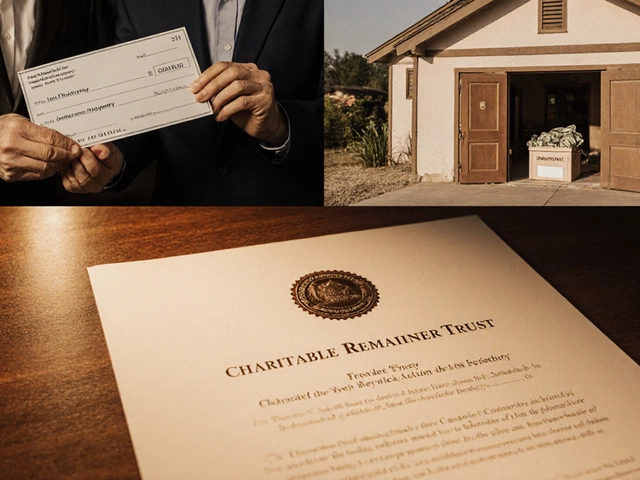Ever thought about how you could leave a mark on the world while enjoying some great tax benefits? That's where a charitable trust comes into play. It's not just for the ultra-wealthy—anyone with a philanthropic spirit can use one. In essence, a charitable trust is a way to support your favorite causes with some or all of your assets, and the good news is, you get some perks along the way.
But how exactly does this work? Imagine your assets as a pie—when you set up a charitable trust, you're essentially slicing up that pie. Part goes to your beneficiaries (like your family), and part goes to a charitable cause of your choice. What's left for you? Some juicy tax deductions, and the satisfaction of knowing you've done good.
We'll dive deeper into the nuts and bolts of setting one up, the different types of trusts you can choose from, and the financial implications. Even if it sounds a bit complex, managing and setting up a trust isn’t rocket science, especially when you've got the right guidance. Ready to explore how you can make a difference with your finances?
- Introduction to Charitable Trusts
- Types of Charitable Trusts
- How to Set Up a Charitable Trust
- Benefits of Charitable Trusts
- Tax Implications and Advantages
- Managing and Monitoring Your Trust
Introduction to Charitable Trusts
So, what's a charitable trust all about? At its core, it's a legal arrangement where you transfer ownership of some assets to a trust managed by trustees who ensure those assets are used for charitable purposes. The magic here? These trusts not only benefit causes close to your heart but can also offer some sweet tax breaks!
Charitable trusts primarily come in two flavors: the charitable remainder trust and the charitable lead trust. A charitable remainder trust is kind of like having your cake and eating it too. You donate assets to the trust, receive income generated by those assets for a specified period, and then whatever is left goes to your selected charity. On the flip side, a charitable lead trust works the other way around: the charity receives income first for a period, then the remaining assets go to your beneficiaries.
Why Set Up a Charitable Trust?
Setting up a trust fund for charity is not just for feeling warm and fuzzy. It's practical! You get to support worthy causes, streamline your estate planning, and like we said before, possibly score some tax benefits. Trusts can also help reduce estate taxes, maximizing the amount your beneficiaries receive. And let's not forget, trusts don't just dissolve—many can last perpetually, continuing your legacy long after you're gone.
For folks driven by philanthropy, a charitable trust is a neat tool. In some cases, you might even receive an immediate income tax deduction depending on how the trust is structured. It's wise to consult with a financial advisor or legal expert to crunch the numbers and see which type fits your goals.
Suppose you're on the fence. In that case, it's worth mentioning that according to a recent study, charitable trusts have been growing steadily, with thousands being established every year in the US alone. People are continually learning how to align their wealth with their values, and trusts play a huge role in that.
Types of Charitable Trusts
Okay, so let's break down the various charitable trusts you can consider. Trust me, there's something here that can suit your goals, whether you worship at the tax-saving altar or are all about leaving a legacy.
Charitable Remainder Trust (CRT)
This is like a win-win situation. You, or another appointed beneficiary, receive income for a set period or lifetime. Once that's over, the remaining assets head straight to your chosen charity. It sounds pretty neat, right? You get an income stream now and leave a legacy later.
Charitable Lead Trust (CLT)
Now, if you want the charity to benefit immediately, a charitable lead trust should do the trick. This type of trust gives funds to a charity first—either a fixed amount or a percentage—for a set period. Afterward, the remaining assets go back to you or other beneficiaries. It's like letting your favorite cause have the first sip of your financial drink.
Pooled Income Fund
Think of this as a communal pot. It's a trust created and maintained by a charity where your donation is pooled with others'. You receive income based on your share, and when the time comes, the remaining assets benefit the charity. It's a way for smaller donors to still make a big splash in the charity pool.
Charitable Gift Annuity
While not technically a trust, this is worth mentioning. You make a substantial donation and, in return, receive a fixed income stream for life. It's a sorta “I’ll scratch your back, you scratch mine” situation with tax benefits on both ends.
And there you have it, the main players in the charitable trust game. The choice boils down to whether you want to benefit your charity now or later and how you’d like to structure that financial journey.
How to Set Up a Charitable Trust
Thinking about setting up a charitable trust? That's awesome! Let's break it down into simple steps so you can make it happen without a hitch. Whether you want to leave a legacy, enjoy some tax benefits, or simply support a charity you love, a charitable trust can be the way to go.
Define Your Purpose
First things first, you need to nail down why you're setting up this trust. Is it for educational causes, healthcare, or maybe animal welfare? Knowing your purpose helps guide all your decisions down the line.
Choose the Right Type of Trust
There are a couple of main types to consider: a Charitable Remainder Trust (CRT) or a Charitable Lead Trust (CLT). A CRT lets you or your beneficiaries receive income first, with the remainder going to charity. A CLT does the opposite, giving income to the charity first, and then passing leftover assets to your family or other beneficiaries. Your financial advisor can help you figure out which one suits your goals.
Draft Your Trust Document
Here’s where a good lawyer steps in. You need a trust deed—a legal document laying out all the nitty-gritty details of the trust like its purpose, terms, and conditions. This is crucial to ensure everything is legit and binding.
Fund the Trust
Time to put your money where your mouth is (literally). You’ll need to transfer assets into the trust. This could be cash, stocks, or property, depending on your strategy and what you've got to offer. The more you fund it, the greater the impact you can make!
Appoint a Trustee
Every trust needs a trustee. This person or entity manages the assets according to your wishes and the trust document. It could be a family member, friend, or a professional like a bank or law firm who specializes in trust fund management.
Review Tax Implications
The tax angle is a biggie. Consult with a tax professional to understand the benefits and obligations you might face. Good news is, charitable trusts usually offer sweet tax breaks, making it a win-win for both you and the causes you care about.
Registration and Compliance
Depending on your location, you might need to register your trust with relevant authorities to make it official and compliant with local laws. It's all about crossing the T's and dotting the I's.
Setting up a charitable trust can seem daunting, but if you chunk it down, it becomes a meaningful and rewarding process. And remember, experts like lawyers and financial advisors are there to help you navigate each step, making the journey a whole lot smoother.

Benefits of Charitable Trusts
Setting up a charitable trust could be one of the smartest moves you make, not just for your peace of mind but also for your wallet. Let's break down the major perks and how they might sway your decision to start one.
Tax Deductions Galore
One of the standout benefits is definitely the tax relief. When you transfer assets to a charitable trust, you can snag significant tax deductions based on the value of the asset and when the trust was set up. Want an immediate tax break? A Charitable Lead Trust might be the way to go, letting you enjoy benefits now rather than later.
Boost to Estate Planning
Thinking about how to handle your estate planning? A trust fund can play a pivotal role. By reducing the size of your taxable estate, you’re not only securing more for your heirs but also ensuring your philanthropy reaches the right causes. It's an efficient way to manage the transition of wealth while sticking to your values.
Securing Your Legacy
When you establish a charitable trust, you're setting up something that can outlive you. Imagine supporting scholarships, medical research, or environmental causes years after you've passed. It's a direct path to leave a lasting impact on issues that matter to you.
Shelter from Capital Gains Tax
Got appreciated assets like stocks or property? Donating them to a charity through a trust can help you sidestep capital gains taxes. Instead of paying a hefty fee, more of your contribution goes straight to supporting the cause!
Nonprofit organizations benefit greatly from these contributions, but you win too by dodging some financial drags.
Flexibility and Control
Charitable trusts offer more flexibility than you might think. You're in control of how funds are distributed, whether it's doling out a specific amount annually or supporting diverse causes over time. It’s your chance to mold your generosity exactly how you envision it.
Overall, the advantages of charitable trusts go beyond just financial benefits, aligning your financial planning with your values. So, while it's important to consult with a financial advisor or expert in trusts, remember that you're not just crunching numbers—you're crafting a meaningful future.
Tax Implications and Advantages
Setting up a charitable trust brings more than just the warm fuzzies—it can significantly lighten your tax load. Here’s the scoop on how that works.
Tax Deductions
When you toss assets into a charity, the government rewards your generosity with a tax deduction. Depending on the type of trust you choose, these deductions vary. For instance, if you set up a Charitable Remainder Trust, you might snag a charitable income tax deduction right off the bat.
The deduction amount often depends on the type and value of the assets you contribute, the trust terms, and the beneficiary's age(s). Chatting with a tax professional makes navigating these waters way easier.
Estate Tax Benefits
Got a hefty estate? A charitable trust can drop the estate tax like a hot potato. Here's how: by moving assets into the trust, they’re no longer part of your estate, which means they're off the hook for estate taxes. This makes a perfect cocktail for preserving wealth while donating to charity.
Capital Gains Tax Savings
Let’s say you’re sitting on appreciated stocks or real estate. Selling them usually means coughing up capital gains tax. However, if you drop those assets into a charitable trust, you can bypass that tax. The trust sells the assets tax-free, and you get cash flow from the proceeds. Talk about a win-win!
Potential Statistics
For those who like numbers, here's a snapshot:
| Tax Benefit | Average Savings |
|---|---|
| Income Tax Deduction | 20% - 50% of contribution |
| Capital Gains Tax Save | 15% - 20% |
Of course, these figures can vary widely, but they might just give you an idea of what's possible.
In a nutshell, wrapping your head around the tax angles of a charitable trust could mean more funds in your pocket while supporting your beloved causes. Don't forget to seek some personalized advice—every financial situation is unique.
Managing and Monitoring Your Trust
Once you've set up a charitable trust, the next big step is making sure it runs smoothly over time. It’s kind of like managing a small nonprofit, only with one major supporter—you! Getting it right means understanding who's steering the ship and how to keep everything on course.
Choosing the Right Trustee
Your trustee is the person or organization that makes decisions and handles the nitty-gritty details of the trust. This could be you, but it's often wise to choose a financial expert or legal professional. Think of them as the captain of your trust, making sure it sticks to your original purpose while navigating any choppy waters.
Regular Check-ins
Just like regular check-ups with your doctor, you should regularly review how your charitable trust is doing. Make it a habit to sit down at least annually to look at financial statements, ensure investments align with your goals, and confirm charitable donations are being dispersed properly.
Staying Compliant
Compliance is key. Different regions have varying laws regarding trusts, so it's crucial to stay on top of these with the help of your trustee. In New Zealand, where I live, charitable trusts must file annual returns. If you're overseas, be sure to check applicable local regulations.
Adjusting the Strategy
As the saying goes, the only constant in life is change. Your charitable trust might need updates as your financial situation or personal priorities evolve. Don’t shy away from tweaking aspects of the trust to keep it aligned with your goals. After all, flexibility is a big part of effective management.
Monitoring Performance
How do you know if your trust is doing well? Keep an eye on those balance sheets and reports! Focus on growth, charitable impacts, and how well the trust supports your selected causes. If you find it overwhelming, engage an accountant or a financial advisor to break it down into simple terms.
Remember, actively managing and monitoring your charitable trust ensures it fulfills its purpose. Whether it's supporting education, environmental causes, or any other noble endeavor, your oversight can make a lasting difference.
| Trust Management Checklist | |
|---|---|
| Task | Frequency |
| Review Financial Statements | Annually |
| Ensure Legal Compliance | Annually |
| Assess Charitable Disbursements | Quarterly |
| Evaluate Trustee Performance | Biannually |






